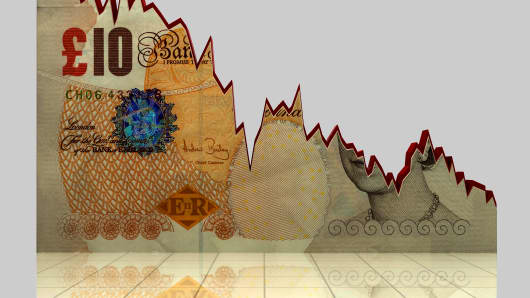Despite recent positive data for the U.K. economy, sterling has sunk 6 percent so far this year. Analysts believe the currency will move even lower this week as outgoing Bank of England Governor Mervyn King prepares to give his last ever inflation report on Wednesday.
"We are now in environment where GBP will drift lower and the quarterly inflation report may be a catalyst to sustain this next move lower," David Bloom, global head of foreign exchange strategy at HSBC told CNBC.com.
In its last quarterly report, the central bank said inflation in the U.K. would remain above target for the next two years, but tightening monetary policy was not the solution as it could push the economy deeper into recession. Sterling fell to a 6-month low against the dollar on the news.
(Read More: UK's EU Vote Bill to Defuse Party Revolt)
Inflation has remained stubbornly above the 2 percent target, and was unchanged for March at 2.8 percent from February. Analysts expect forecasts to receive another revision on Wednesday.
"We think the Bank of England is likely to lower its near-term inflation forecast slightly due to the sharp fall in oil prices and stabilization in sterling recently," Bloom said. "We forecast GBP/USD to reach 1.50 by the end of [the second quarter] and to continue to fall to 1.48 by the end of 2013."
Deutsche Bank is also adding short positions.
"The bearish GBP story is still alive," George Saravelos, a currency strategist at Deutsche Bank said in a research note. Dennis Gartman, the editor and founder of the Gartman letter said that sterling's rally over the past several weeks looks vulnerable as David Cameron's government "becomes more and more tenuous with each passing day".
On Friday, RBS re-opened its bearish outlook on the currency, urging investors to establish a short GBP/USD position adding that it could hit 1.48 dollars from its current position of 1.53 dollars.
But analysts at both Lloyds and Monex Europe aren't as convinced. They believe that the market is still overly short the pound, meaning there is a lot of room for sterling to climb higher.
(Read More: UK Government Split Over EU Membership)
"Sterling-dollar should reclaim ground up to $1.54 in the aftermath of the quarterly inflation report. We believe this is just part of sterling upside and predict a value of $1.57 by quarter end, Eimear Daly, head of market analysis at Monex Europe told CNBC.com.
Service sector growth figures last month added to signs that the U.K. economy may be gaining some traction. The Markit/CIPS services Purchasing Managers' Index rose to 52.9 in April, above expectations and its highest reading since August 2012. On Tuesday, the OECD leading indicator pointed to modest growth in the U.K. over the coming months with March's figure edging up to 100.73 from 100.70 in February.
"As Mervyn King's final quarterly inflation report, the Governor of the BoE is sure to want to leave markets with a positive impression on what he achieved in his term. Thus we can expect an overly optimistic reading on the U.K. economy," Daly told CNBC.com. But analysts, including Daly conclude that policy action is likely to resume when outgoing Bank of Canada Governor Mark Carney takes the helm in July.
(Read More: Next 'Star Wars' Film to Be Made in Britain)
"It seems unlikely that Carney has been brought in to simply sit on his hands," Paul Robson, a senior currency strategist at RBS said in a research note.
Expectations are high that Mark Carney will announce his version of "whatever it takes" when he takes over, David Bloom told CNBC.com, adding that monetary "shock and awe" is unlikely to be easy in the U.K., given the MPC's (Monetary Policy Committee) remit and toolkit.
"Mr Carney may have to settle for souping up existing policies," he said.
—By CNBC.com's Matt Clinch; Follow him on Twitter
@
mattclinch81



